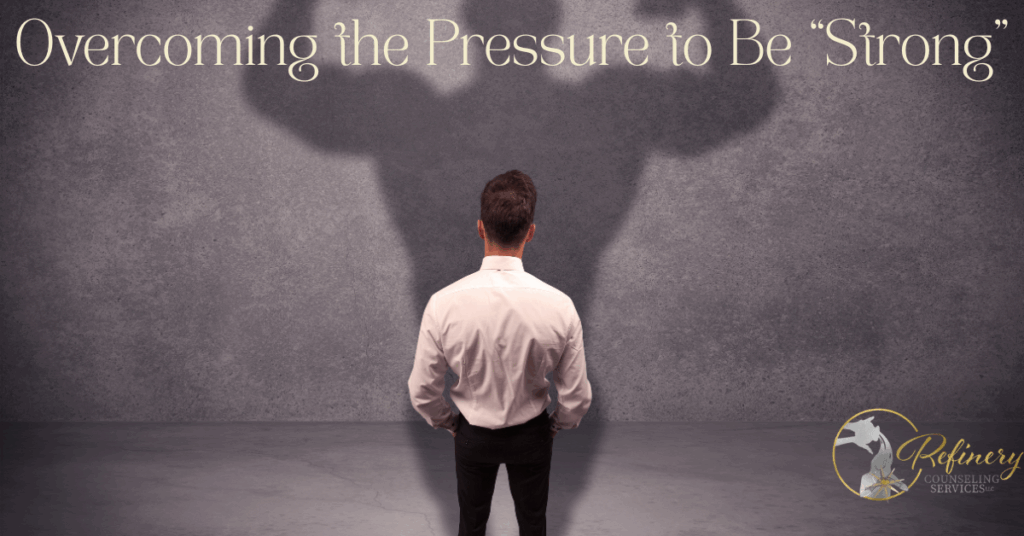For generations, men have been told to “man up,” “stay strong,” and “never let them see you sweat.” These messages, while often well-intentioned, have created a culture where vulnerability is seen as weakness, emotional expression is discouraged, and seeking help is stigmatized. The pressure to uphold an image of invulnerability can become a silent burden—one that takes a heavy toll on men’s mental health.
In this post, we examine the societal expectations that keep men from addressing their mental health needs, explore the emotional cost of this pressure, and offer practical ways to challenge and change the narrative.
The Weight of Expectations
Cultural norms around masculinity can be deeply ingrained. From childhood, boys are often rewarded for being tough and punished—sometimes subtly, sometimes overtly—for showing emotion.
- “Boys don’t cry“ becomes a mandate rather than a moment.
- Emotional regulation is replaced with emotional suppression.
- Asking for help is seen as a failure rather than a step toward healing.
The result? Many men internalize the idea that they must face stress, grief, trauma, and anxiety alone. This internalized pressure can lead to increased rates of depression, substance use, and even suicide among men.
In our cornerstone post Breaking the Silence: Men and Mental Health – Why It’s Time to Talk, we explored the staggering statistics that underscore how much men suffer—often in silence. To break through these barriers, we must first recognize them.
Emotional Repression and Its Costs
Suppressing emotions doesn’t make them disappear; it pushes them beneath the surface where they can fester. Over time, this can manifest as:
- Anger or irritability as a default response to emotional distress
- Physical symptoms like headaches, muscle tension, or digestive issues
- Disconnection from loved ones or difficulty maintaining close relationships
- Burnout from trying to “do it all” without showing signs of struggle
Men who bottle up their emotions may appear functional but often fight internal battles without tools or support.
In Man Enough to Care, we outlined practical self-care strategies that offer men healthier ways to manage and express what they feel. These strategies are not “soft” alternatives but critical tools for resilience.
Shifting the Narrative: Strength in Vulnerability
True strength isn’t about silence or stoicism; it’s about the courage to be honest, to ask for help, and to show up fully. Here’s how we can help men rewrite the narrative:
1. Challenge Cultural Norms
Talk openly about mental health. Share stories of struggle and healing. Normalize therapy, emotional expression, and rest.
2. Model Vulnerability
Leaders, fathers, mentors, and peers can be powerful role models by showing that it’s okay to not be okay. When men in positions of influence share their emotional journeys, it paves the way for others.
3. Create Safe Spaces
Men need environments where they can speak freely without fear of judgment. Creating places where men can be seen and heard is essential, whether it’s a men’s group, a spiritual community, or a therapy session.
4. Use Supportive Language
Language shapes perception. Replace phrases like “man up” with “lean in” or “reach out.” Encourage men to listen to themselves and one another with empathy.
5. Prioritize Connection
Isolation breeds emotional stagnation. In our recent post, The Power of Connection: Why Building a Support System Matters for Men, we discussed how relationships are a cornerstone of emotional health. Reaching out and forming authentic bonds can reduce shame and increase healing.
Redefining What It Means to “Be Strong”
Strength is not about how much you can endure in silence—it’s about how honest you can be with yourself and those around you. It’s about:
- Taking a break when you need rest
- Reaching out when you need help
- Letting go of perfectionism and pressure
- Showing up authentically in your relationships
The journey to better mental health starts with small steps. If you’re a man carrying the weight of societal expectations, know this: you are not alone, and there is nothing weak about choosing healing.
Final Thoughts
During Men’s Mental Health Month, let’s do more than raise awareness—let’s take action. Let’s break down outdated ideas of masculinity and replace them with a healthier, more compassionate standard that honors the full spectrum of human experience.
You don’t have to prove anything to anyone. You are allowed to struggle. You are allowed to ask for help. And most importantly, you are worthy of support and healing.

